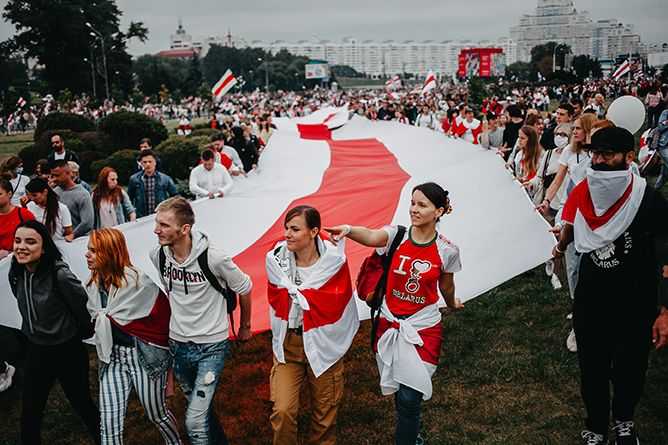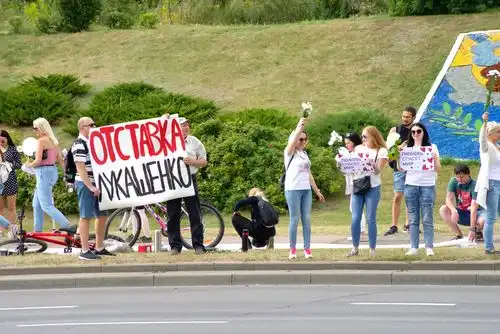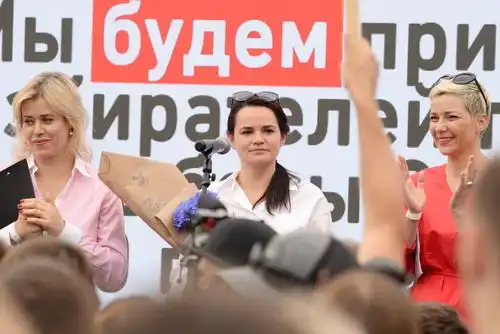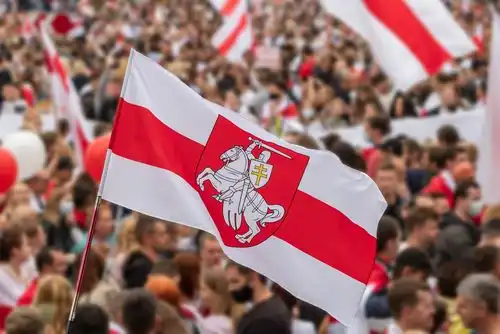Home>The Belorussian War will Not Take Place

02.10.2020
The Belorussian War will Not Take Place
Interview with Marie Mendras, CNRS Research Fellow, CERI Sciences Po, and Professor, Paris School of International Affairs, Sciences Po.
Can you summarize the events that have taken place in Belarus since the massive fraud in the presidential election of 9 August 2020? Where does this unprecedented popular mobilisation come from?
A short reminder of how Alexander Lukashenko’s 26 years at the head of Belarus unfolded is useful to helping us understand why the vast majority of Belarusians can no longer bear the dictator. In 1994, the former director of an agricultural sovkhoze was elected president. He did not offer to de-sovietise the economy or society, and promised security and good relations with Moscow. The economic situation improved in the 2000s, thanks to a boom in Russian hydrocarbons, for which Belarus provided part of the refining and transport to Europe. The curve reversed in the 2010s and the country grew poorer. Meanwhile, the younger generation did not recognize itself in this aging and reactionary leader.
Lukashenko, who embodied the national and independent republic in the 1990s, gradually built up his sovereign domain and installed a repressive autocracy. He took control of the political institutions. He imposed—through a manipulated referendum in 2004—a constitutional revision that abolished all limits on presidential terms. He then behaved as if he were the head for life of a state of 10 million inhabitants. In 2006, he harassed and imprisoned the opposition presidential candidates and declared his own victory through massive fraud. He used the same methods to claim victory on 9 August 2020, when less than 20% of Belarusians are likely to have given him their vote.
This summer’s events tell the story of the end of his reign. They recall other major upheavals, such as the Solidarnosz movement in Poland in the 1980s, the Velvet Revolution in Czechoslovakia in 1989, Ukrainian independence in 1991, reinforced by the Orange Revolution in 2004 and EuroMaidan in 2013-2014. Belarus 2020 is also the mirror of Russia 2020, where the anti-Putin protest is spreading to many cities, notably Khabarovsk, where citizens have been protesting against the unjust imprisonment of their elected governor since last July.

How is it possible that we, in Europe, have not taken the full measure of the crisis in Belarus?
For the sake of convenience, governments and opinions merely accepted a simplistic vision of “the last dictatorship in Europe”, accepted by the people. It was more comfortable to believe the official discourse and settle for the idea that it was better to “entrust Putin” with Belarusian affairs, while still applying sanctions against the leaders. Moreover, Lukashenko played well in 2014 by offering himself as a mediator in the Donbass conflict in Ukraine and by welcoming to Minsk François Hollande, Angela Merkel, Vladimir Putin, and Piotr Poroshenko. The two Minsk agreements were signed in September 2014 and February 2015.
And yet, the academic world, the European Parliament, NGOs, have consistently condemned the serious abuses and crimes committed by Lukashenko and his repressive organs. At the CERI, I invited Belarusian colleagues and experts to speak at the “Russia Observatory” seminar series. In 2005, Alexander Milinkievich, candidate for the presidential election, presented his programme to us and exposed the constant harassment that he and his allies were subjected to. He was only credited with 6% of the votes in the presidential election of March 2006—a percentage well below the 28% of votes he would have received before the fraud. The well-known scenario of “preventive repression—manipulated votes—repression of protests against fraud” was repeated in 2010 and 2015, as it has been in Russia since the mobilisation of millions of voters against the spectacular fraud in the legislative elections of December 2011.

How was the mobilisation organised this summer?
Hostility to the regime has been uniting more and more Belarusians over the last 15 years. But the brutality of the repression and the muzzling of the media gave the impression that the society was being tamped down. In reality, the ferment of protest has fed the younger generation and awakened the parents. The fire was smouldering. The spark that brought the protests to life was the arrest or forced exile of Lukashenko’s opponents, to make their presidential candidacies impossible. The most popular figure was Sergey Tikhanovsky. After his imprisonment, his wife Svetlana Tikhanovskaya submitted her candidacy and was able to compete. Lukashenko did not take a 34-year-old housewife seriously!
The virtuous circle was then set in motion. Two other women joined forces with Tikhanovskaya to form an exceptional trio. Crowds flocked to all the cities to listen to and cheer the candidate who defends democracy, reforms, and balanced relations with European neighbours as well as with Russia. The atmosphere was joyful, summery, optimistic, and very combative. Lukashenko had already lost the battle.
Thanks to the Internet, YouTube, and smartphones, Belarusians were able to mobilise quickly. Once people are sure that several thousand will take part in a demonstration, they are no longer afraid to go out on the streets. And the Ukrainian example was a source of inspiration, as was the example of the Russian opposition, around Alexey Navalny, as well as popular protest in the provinces, such as in Khavarovsk, near the border with China. One of the slogans was “We are no longer afraid! Lukashenko, get out!” And, indeed, violence no longer deterred people from speaking out. On the contrary, it strengthened the determination of the Belarusians in their demand for a change of regime, by peaceful and legalistic means.
It is necessary to underline a major factor that has taken the power that be by surprise. This is the courageous mobilisation of workers and employees of state-owned enterprises. These “soldiers” of Lukashenkism are glorified by the official phraseology, but above all they are summoned to produce in silence. They are forbidden to join a union freely, and their right to strike is tightly regulated. Worse, the majority of employees are employed on the basis of a one-year fixed-term contract that is not guaranteed to be renewed. This is meant to ensure everyone’s loyalty. The citizens’ revolution took an unprecedented turn when most state-owned enterprises went on strike in August and began a peaceful discussion with their managers, who were often sympathetic. The employees are continuing this struggle through strikes “à l’italienne” when workers take turns in short moments of inactivity.
What can Lukashenko still hope for?
Alexander Lukashenko is no longer president, since he was not re-elected and his fifth term is coming to an end. He is a usurper. And the fact that he staged his inauguration on 23 September on the sly and without announcement underlines his isolation and his fear of prosecution if he leaves his palace. The European Union has strongly denounced this illegal act and has reaffirmed that Lukashenko is no longer head of the Belarus state.
Faced with the resistance of an entire society, Lukashenko is trying to buy time by using extreme violence: disappearances, torture, murders, imprisonments, beatings, harassment of families, deportation of political figures. He put himself in Vladimir Putin’s hands by prostrating himself before the Russian leader in Sochi, Russia, on 14 September. By imprisoning and forcibly exiling the leaders of the peaceful revolution, he gave them an impressive aura. Svetlana Alexievich, who received the Nobel Prize for Literature in 2015, was the only one of the seven members of the Presidium of the Coordinating Council who remained free in Minsk. She was being constantly harassed, and chose to go to Germany for medical treatment at the end of September. This council now asserts itself as the institution that can support a political transition.
Lukashenko will eventually leave his presidential palace. Perhaps the most he can hope for is to take refuge in a “friendly” state, to flee the justice of his country, European justice, and the International Criminal Court.
What is Vladimir Putin’s interest in supporting the Belarusian president, who is now hated by a large part of his population?
Putin does not support Lukashenko fervently, far from it, but he is buying time. He has very little leeway. He granted the Belarusian comrade a loan renewal to avoid the crash. But he must know that Lukashenko will not last long.
The solution does not lie in Moscow. Europeans should not expect an acceptable resolution of the crisis from Moscow. Quite the contrary. We understand, as do the Belarusians themselves, that Putin is the last obstacle to the dictator’s downfall. For the Russian autocrat, it is unbearable to see another autocrat fall, after the Ukrainian Yanukovich, after the tyrants of the Arab world, and also after the sanction of the ballot boxes in Turkey, Iran, and Venezuela, where the leaders are challenged and may one day lose.

Is it possible to envisage a military action by Russia in Belarus such as the one carried out by Moscow in Crimea and Donbas?
Belarus differs from Ukraine on the geographical, human, economic, and strategic levels. It has neither a Crimean Peninsula nor the equivalent of Donbass, i.e. a region where the population would feel closer to Moscow than to Minsk. Mogilev in the east of the country is fighting just as fiercely for the departure of Lukashenko as Grodno in the west. What objective would the Russian army pursue? And for what benefits? Undoubtedly, Vladimir Putin does not want to, and cannot, occupy Belarus and then rule it. Despite the union agreement signed by Minsk and Moscow in 1999, the incorporation of Belarus into a federal state controlled by Moscow has never been a serious option.
Another reason why the Kremlin would be cautious is the new demonstration of solidarity by the Western democracies in their support for the Belarusians, as in 2014 in favour of the Ukrainians. Not a single European government has recognised Alexander Lukashenko as re-elected. The lessons of Ukraine have been learned by Western countries, and by former Soviet republics: Putin creates the problem, and then claims to be the only one who can solve it.
The positions taken by the European states no longer leave any room for ambivalence. Before his departure for Lithuania, on 26 September, French President Emmanuel Macron told the Journal du Dimanche: “Lukashenko must go!” Clearly, his telephone conversation with Vladimir Putin on 14 September finally convinced him of the unreasonable attitude of his Russian counterpart. Pushed into a corner, Putin had concluded that Alexei Navalny, a “troublemaker blogger”, had “poisoned himself” and was getting rich thanks to false allegations and blackmail. The apartment of the Russian opponent and his family was seized on 24 September. Svetlana Tikhanovskaya is expected to give an address to the French National Assembly's foreign affairs committee on 7 October 2020.
What lesson can Putin, yet another leader concerned about retaining power, draw from the awakening of the Belarusian people for their own future?
It is a disaster for Putin to see a fellow dictator in a former republic of the USSR fall. Indeed, Putin finds himself in an increasingly uncomfortable situation in his own country. Let us recall that he organised a “plebiscite” at the end of June 2020—just as fabricated as that of Lukashenko on 9 August—to win two more mandates. Because he is too focused on retaining power for life, he takes risks and exasperates millions of Russians. Navalny’s botched poisoning came at the worst possible moment for him. Angela Merkel visited Navalny at the Berlin Charité hospital in September.
Vladimir Putin never wanted to rebuild the USSR. But, for the survival of his own regime, he sought to keep Ukraine, Belarus, Moldova, Georgia, Armenia, and Azerbaijan—wedged between the European Union and Russia—in a state of energy and security dependence. Or, to say it differently, to freeze them in a weak and conditional sovereignty, subject to the goodwill of Moscow. This strategy seems to be failing again, as it did in Georgia, Ukraine, and Armenia, where political alternation succeeded against Moscow’s will. Instead of strengthening its sphere of influence, the Russian power is losing its “buffer states” one after the other.
There will be no satisfactory solution for the Russian autocrat, for he will be able neither to keep Lukashenko in place, nor to replace him with a loyal servant, nor to occupy and control Belarus. Putin probably hopes to weaken the future government through continued economic interference, infiltration of the administration, army, and Belarusian KGB, as well as through disinformation and corruption.

What about international reactions to the Belarusian crisis outside Russia? The United States is cautious, but the European Union proves very determined to force illegitimate Lukashenko out, and support new elections, under international scrutiny.
The United States finds itself even more paralysed than in August 2008 during the short Russian war in Georgia, when Bush finished his second term. On the other hand, all the institutions of the European Union have reacted well and relatively quickly, and most European states have given their support to Belarusian society.
Let’s put it clearly: Svetlana Tikhanovskaya is not the leader of a minority opposition, but the candidate who won the presidential election by a large majority (excluding fraud). By winning the election, the opposition became the majority and represents the sovereign people. To denounce the sham of 23 September inauguration, the Belarusians demonstrated en masse to celebrate the “investiture of the people”.
The resolution voted on 17 September 2020 by the European Parliament, along with a historic resolution on the poisoning of Alexei Navalny, mark the commitment of Europeans to a democratic and peaceful outcome, with no interference from Russia, in order to support a transition carried out with respect for a sovereign institutional process: to recognize a transitional body that will organize new presidential and legislative elections, with independent observation missions.
Should we fear dangerous decisions from the Kremlin? And if we fear them, should we seek an impossible “appeasement” that would involve maintaining a dictatorship in a country of 10 million inhabitants on the European continent? Let us stop believing that Vladimir Putin is doing us a favour by ensuring the security of Eastern Europe. Ukraine 2014 has taught us a lesson: any confusion, any uncertainty about the full sovereignty of a neighbouring state of Russia weakens the state in question, and creates insecurity for the population of that state, and for Europe as a whole.
Interview by Corinne Deloy.
Further reading (in French)
"Vote populaire par temps d’épidémie"
Follow us
Contact us
Media Contact
Coralie Meyer
Phone : +33 (0)1 58 71 70 85
coralie.meyer@sciencespo.fr
Corinne Deloy
Phone : +33 (0)1 58 71 70 68
corinne.deloy@sciencespo.fr
